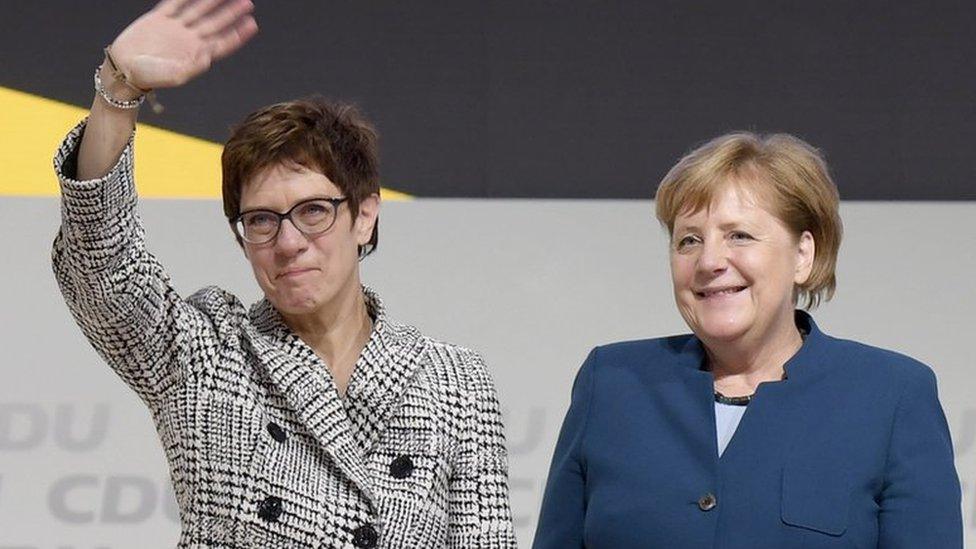Merkel successor Kramp-Karrenbauer threatens to quit and wins ovation
- Published
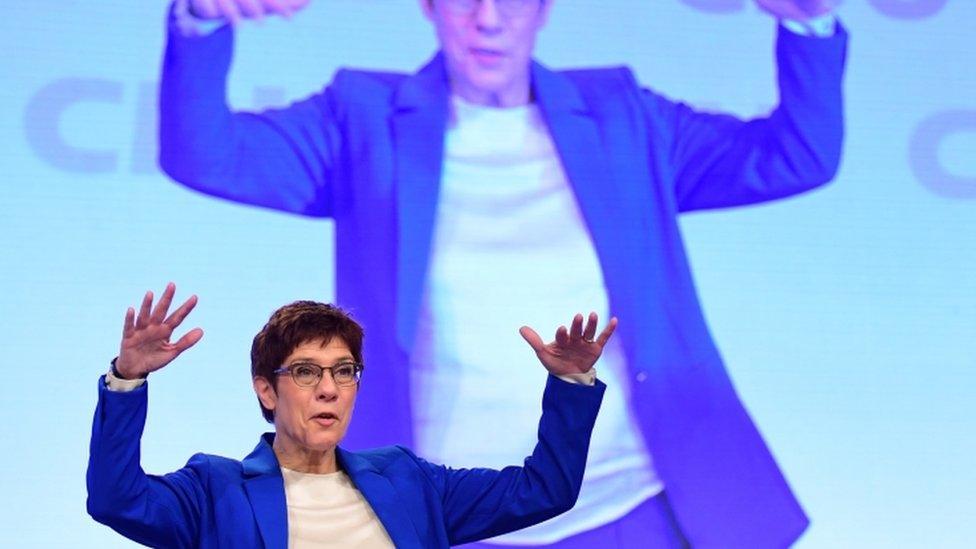
Annegret Kramp-Karrenbauer came out fighting with a speech that secured the support of both her party and her chief critic
Angela Merkel's would-be successor as German chancellor has threatened to stand down as leader of the CDU if her centre-right party fails to back her.
Annegret Kramp-Karrenbauer, known as AKK, urged critics to support her vision for Germany at the party's annual congress in Leipzig.
She has faced mounting criticism since replacing Mrs Merkel as CDU leader.
However, her threat to resign prompted a lengthy ovation and a pledge of loyalty from her main critic.
Poor election results and her low popularity have led to discontent within the CDU. But in a speech on Friday, Ms Kramp-Karrenbauer, 57, issued an ultimatum to her opponents.
"If you are of the opinion that the Germany I want is not the one you want... then let's end it. Here, now and today," Ms Kramp-Karrenbauer told delegates.
"But, dear friends, if you want this Germany, if you want to take this path together... then let's roll up our sleeves here and now and make a start."
At the end of the speech, delegates gave the party leader a standing ovation that lasted at least three minutes.
Mrs Merkel, who also gave a speech at the congress, struck a more conciliatory tone, calling for party unity.
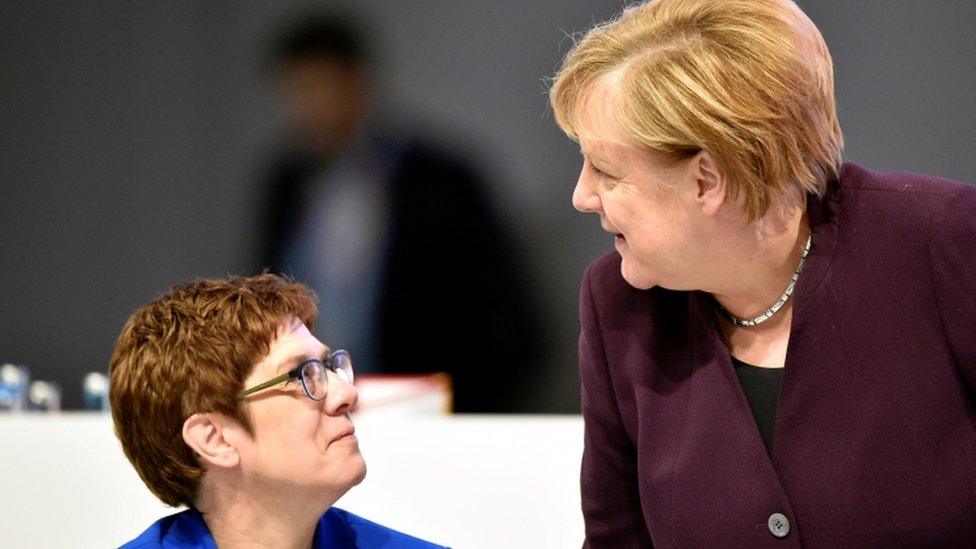
Ms Kramp-Karrenbauer replaced Angela Merkel as CDU leader in December 2018
As leader of the Christian Democratic Union - Germany's largest party - Ms Kramp-Karrenbauer is favourite to succeed Mrs Merkel when she stands down in 2021.
She was also given the role of defence minister during the summer, but shocked colleagues when she suggested sending German soldiers to northern Syria as part of a an international security zone.
Friedrich Merz, a millionaire lawyer who narrowly lost out to Ms Kramp-Karrenbauer in last year's leadership vote, recently described the CDU-led government as "abysmal".
He remains one of Ms Kramp-Karrenbauer's most vociferous critics but applauded her speech and promised loyalty. "We are loyal, to our chairwoman, and to the government," he said.

AKK will have to tread carefully

The warm, savoury smell of lunch began to waft into the conference centre. Annegret Kramp-Karrenbauer had been speaking for an hour and, as stomachs rumbled, her audience began to look a little restless.
But Angela Merkel looked on approvingly as the woman she backs as her successor as party leader and, potentially, chancellor, suddenly delivered a defiant challenge to her critics and the man who's been snapping at her heels for months.
The powerful - and lengthy - standing ovation which followed suggests she has the backing of her party - for now. But privately delegates confide that they're still not sure. AKK is seen as a continuity candidate, her greatest strength or her greatest weakness, depending on who you ask. Polls also suggest she doesn't have the public's confidence.
It's clear Friedrich Merz, who later gave a confident and rousing speech, still considers himself to be in the running. AKK will have to tread carefully.
There are two years before Mrs Merkel is due to stand down and, besides Mr Merz, a number of others nurture ambitions for the top job. They're just waiting, some more quietly than others, for the right moment to make their move.

Mrs Merkel has been chancellor since 2005 but with her fourth consecutive term due to end in December 2021, party turmoil has thrown AKK's candidacy into doubt.
Earlier this year, she was forced to dismiss a report that she believed Ms Kramp-Karrenbauer was not up to the job.
Since then, a fractious debate about the political direction of the party has escalated.
How Angela Merkel rose to power to lead Germany
In the European Parliament elections in May, the conservative bloc had its worse result since World War Two. The CDU and its sister party, the Christian Social Union, finished on top but support fell to 28.9% - down more than 7% from the last election four years ago.
Then, in October, the far-right Alternative for Germany (AfD) beat the CDU into third place in the eastern German state of Thuringia.
Who is AKK?
Popular in Berlin and her home state of Saarland in the south-west, Annegret Kramp-Karrenbauer has a reputation for calm analysis and political acumen.
She joined the party as a student in 1981 and quickly rose up the ranks of state politics, becoming the first woman to serve as a state minister for internal affairs in 2000, and the first woman to serve as prime minister of Saarland.Merkel successor threatens to quit as party leader
Allow X content?
This article contains content provided by X. We ask for your permission before anything is loaded, as they may be using cookies and other technologies. You may want to read X’s cookie policy, external and privacy policy, external before accepting. To view this content choose ‘accept and continue’.

A Merkel loyalist, she is expected to replicate much of the chancellor's style and policy.
She has differentiated herself from her mentor, however, by voting in favour of quotas for women on corporate boards and by taking a tougher line on Russia.
She is also more conservative on social issues like gay marriage, and has vowed to review the country's position on security and migration.
- Published3 June 2019
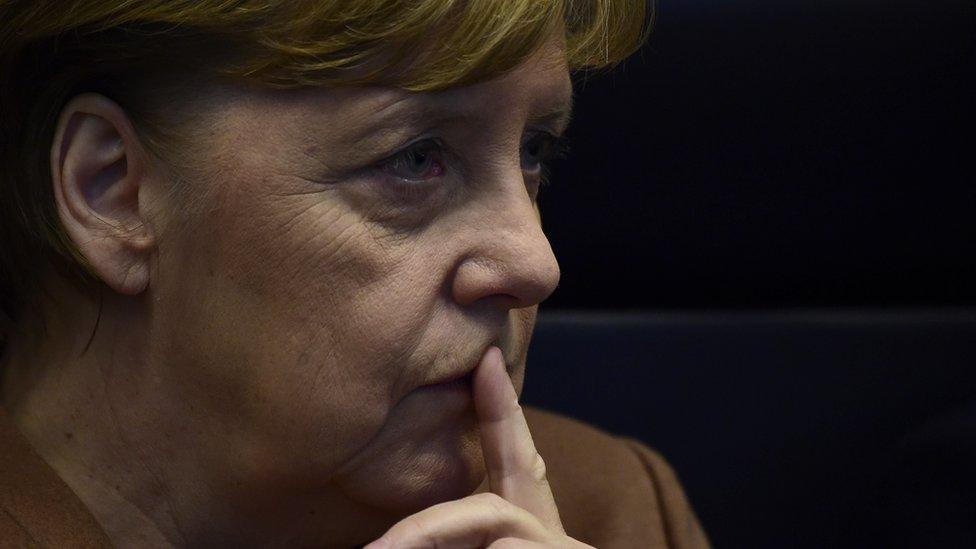
- Published29 May 2019
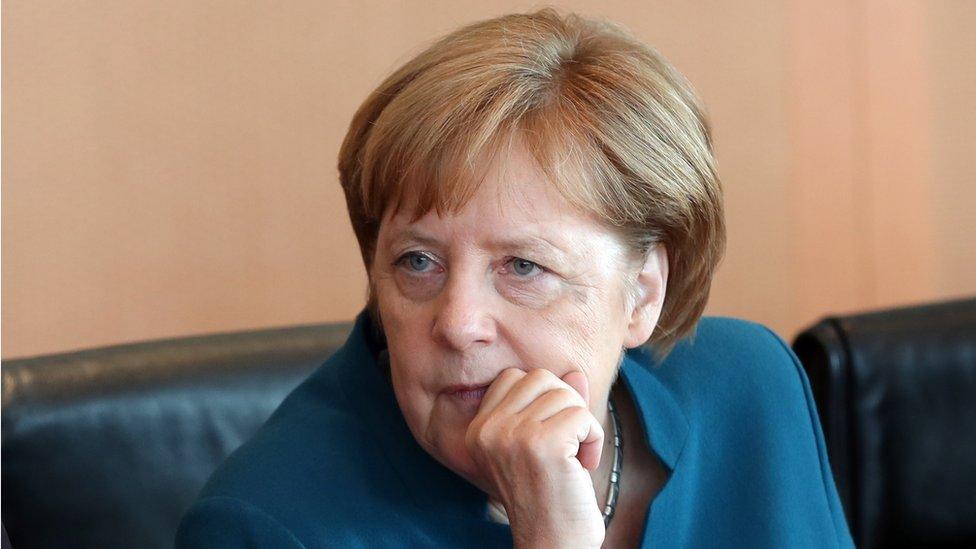
- Published7 December 2018
